Winter Into Spring
Fetid Adders Tongue
 We first came across this attractive lily years ago on the trail leading up to Cataract Falls from the Fairfax-Bolinas road. It was early January and the earliest we'd see it in bloom; the latest would be the last day of March 2008 on the Alpine Lake portion of the Kent Trail. We only saw one blossom that spring day but there were carpets of large Scoliopus leaves covering stretches of the up-hill side of the trail.
We first came across this attractive lily years ago on the trail leading up to Cataract Falls from the Fairfax-Bolinas road. It was early January and the earliest we'd see it in bloom; the latest would be the last day of March 2008 on the Alpine Lake portion of the Kent Trail. We only saw one blossom that spring day but there were carpets of large Scoliopus leaves covering stretches of the up-hill side of the trail.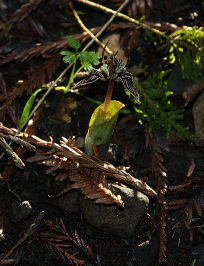 Year to year we always find it blooming sometime between the end of January and the end of February on the west side of Lake Lagunitas, usually on the up-hill side of the the fireroad--one or two turns from the dam. The young Scoliopus to the right surprized me. I didn't realize the flower opened so soon after the leaves pushed through the mulch. That seems to explain seeing young flowering plants with many pediceled seeds just laying about.
Year to year we always find it blooming sometime between the end of January and the end of February on the west side of Lake Lagunitas, usually on the up-hill side of the the fireroad--one or two turns from the dam. The young Scoliopus to the right surprized me. I didn't realize the flower opened so soon after the leaves pushed through the mulch. That seems to explain seeing young flowering plants with many pediceled seeds just laying about.
Family: Liliaceae
Scientific Name: Scoliopus bigeloviiCalFlora
Milkmaid
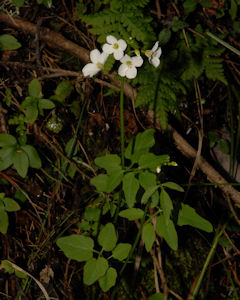 Milkmaids are found just about everywhere around Lake Lagunitas during the early part of the year, particularly February and March. They are the modest harbinger of Spring.
Milkmaids are found just about everywhere around Lake Lagunitas during the early part of the year, particularly February and March. They are the modest harbinger of Spring.
Family: Brassicaceae
Scientific Name: Cardamine californica var. californica
CalFlora
Hound's Tongue
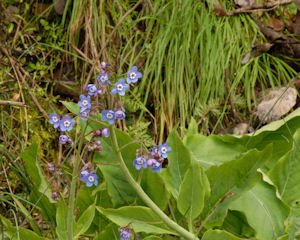 Hound's Tongue is like the Milkmaid's wild dog--they're seen at about the same time, but not always in the same place.
Hound's Tongue is like the Milkmaid's wild dog--they're seen at about the same time, but not always in the same place.
Family: Boraginaceae
Scientific Name: Cynoglossum grande
CalFlora
Saxifraga californica

 It would be eazy to overlook this little gem were it not for those small bright red anthers. We've seen it in a few places around the lake, but the largest population is along the sedum wall. In 2008 this was in mid March.
It would be eazy to overlook this little gem were it not for those small bright red anthers. We've seen it in a few places around the lake, but the largest population is along the sedum wall. In 2008 this was in mid March.
Family: Saxifragaceae
Scientific Name: Saxifraga californica
Calflora
Trillium Wakerobin
 Trilliums are pretty common but when you're walking along the lake trail and come across four or five freshly-opened near perfect plants it becomes a WHOA! moment. These were a few yards before the second bridge (going counterclockwise from the dam) on the up-hill side. It seems the pedicel that lifts the flower above the leaves can be shorter in a plant that has recently opened. Petals change to pink/purple with age.
Trilliums are pretty common but when you're walking along the lake trail and come across four or five freshly-opened near perfect plants it becomes a WHOA! moment. These were a few yards before the second bridge (going counterclockwise from the dam) on the up-hill side. It seems the pedicel that lifts the flower above the leaves can be shorter in a plant that has recently opened. Petals change to pink/purple with age.
Family: Liliaceae
Scientific Name: Trillium ovatum var. ovatum
Calflora
Indian Warrior
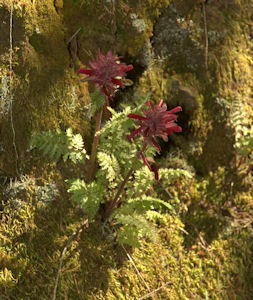 OK.OK it's a warrior not a paintbrush, at least they're both Scrophs. Well, maybe not. Pedicularis and Castilleja seem to have moved to the family Orobanchaceae which I have no idea how to dramatically abbreviate.
OK.OK it's a warrior not a paintbrush, at least they're both Scrophs. Well, maybe not. Pedicularis and Castilleja seem to have moved to the family Orobanchaceae which I have no idea how to dramatically abbreviate.
You can find this beauty at spots around the lake, but we always find a hearty group at the beginning of Sky Oaks Road just off the Fairfax-Bolinas Road. Indian Warrior was particularly abundant along sections of the Kent Trail on the southeast side of Alpine Lake heading towards the Bon Tempe Dam. They were blooming in 2008 during the middle of March and later.
Family: Scrophulariaceae (Orobanchaceae)
Scientific Name: Pedicularis densiflora
Calflora
Mist Maiden
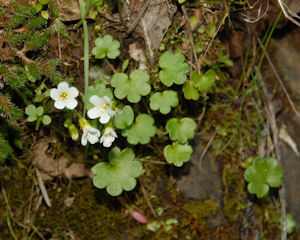 Pretty and small this native stands out because of its' scalloped leaves and the yellow
throat of the flower. If the commercial nurseries could create a ground cover this attactive--they would make money.
Pretty and small this native stands out because of its' scalloped leaves and the yellow
throat of the flower. If the commercial nurseries could create a ground cover this attactive--they would make money.
Family: Hydrophyllaceae
Scientific Name: Romanzoffia californica
CalFlora
Shooting Star
 The Shooting Star is an early bloomer. In the lakes area around Lagunitas we've seen it primarily in February and March. I'd call it the harbinger of spring except I've already suggested that moniker for the milkmaids. Then there are others that are going to say the true harbinger of spring is Scoliopus. Well, should we really have something fetid so honored? OK, OK it's the Milkmaids, but Dodecatheon is a contender--I'm open to argument.
The Shooting Star is an early bloomer. In the lakes area around Lagunitas we've seen it primarily in February and March. I'd call it the harbinger of spring except I've already suggested that moniker for the milkmaids. Then there are others that are going to say the true harbinger of spring is Scoliopus. Well, should we really have something fetid so honored? OK, OK it's the Milkmaids, but Dodecatheon is a contender--I'm open to argument.
Family: Primulaceae
Scientific Name: Dodecatheon hendersonii
Calflora
Miner's Lettuce
 Miner's Lettuce, yes Miner's Lettuce. Eat it if you're hungry, but hopefully you're packing blue-cheese, because damn--it needs something.
Miner's Lettuce, yes Miner's Lettuce. Eat it if you're hungry, but hopefully you're packing blue-cheese, because damn--it needs something.
Family: Portulacaeae
Scientific Name: Claytonia perfoliata
Calflora
Sun Cup
 It can be flat when out in the open but it is pretty and loves the sun. The last half of March we would see it on the east side of Lake Lagunitas along the fire road, but really it's everywhere.
It can be flat when out in the open but it is pretty and loves the sun. The last half of March we would see it on the east side of Lake Lagunitas along the fire road, but really it's everywhere.
Family: Onagraceae
Scientific Name: Camissonia ovata
CalfloraEarly SpringHome
Comments and Corrections We first came across this attractive lily years ago on the trail leading up to Cataract Falls from the Fairfax-Bolinas road. It was early January and the earliest we'd see it in bloom; the latest would be the last day of March 2008 on the Alpine Lake portion of the Kent Trail. We only saw one blossom that spring day but there were carpets of large Scoliopus leaves covering stretches of the up-hill side of the trail.
We first came across this attractive lily years ago on the trail leading up to Cataract Falls from the Fairfax-Bolinas road. It was early January and the earliest we'd see it in bloom; the latest would be the last day of March 2008 on the Alpine Lake portion of the Kent Trail. We only saw one blossom that spring day but there were carpets of large Scoliopus leaves covering stretches of the up-hill side of the trail. Year to year we always find it blooming sometime between the end of January and the end of February on the west side of Lake Lagunitas, usually on the up-hill side of the the fireroad--one or two turns from the dam. The young Scoliopus to the right surprized me. I didn't realize the flower opened so soon after the leaves pushed through the mulch. That seems to explain seeing young flowering plants with many pediceled seeds just laying about.
Year to year we always find it blooming sometime between the end of January and the end of February on the west side of Lake Lagunitas, usually on the up-hill side of the the fireroad--one or two turns from the dam. The young Scoliopus to the right surprized me. I didn't realize the flower opened so soon after the leaves pushed through the mulch. That seems to explain seeing young flowering plants with many pediceled seeds just laying about.








